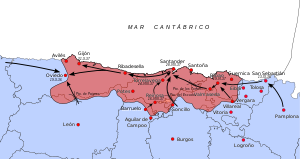Battle of Bilbao
| Battle of Bilbao | |||||||||
|---|---|---|---|---|---|---|---|---|---|
| Part of the Spanish Civil War | |||||||||
 The Northern Front. Bilbao is on the right of the red area. |
|||||||||
|
|||||||||
| Belligerents | |||||||||
|
|
|
||||||||
| Strength | |||||||||
| 50,000 troops and militia | 60,000 Nationalist troops 15,000 Italian troops |
||||||||
| Casualties and losses | |||||||||
| Unknown |
Nationalist Spain: Unknown Italy: 105 dead 427 wounded three missing |
||||||||
The Battle of Bilbao was part of the War in the North, during the Spanish Civil War where the Nationalist Army captured the city of Bilbao and the remaining parts of the Basque Country still held by the Republic.
Bilbao was the capital of the autonomous Basque area established by the Republic after the war began. This establishment was in payment for Basque Nationalist support of the Republic. The Basque people in Spain generally inhabit four provinces, Navarre, Álava, Gipuzkoa and Biscay. The Basque Nationalists were dominant in the latter two provinces. Navarre and Álava had rallied to the rising against the Republic.
The Spanish Nationalists troops gained Gipuzkoa early in the war with the fall of Irún in August and San Sebastián on 13 September 1936, isolating the Basque country and the Northern Republican held zone from the French frontier. On 31 March, the Nationalist, led by the General Mola, launched an offensive against the Biscay province. The Basque troops had to retire and by June the Nationalist reached the outskirts of Bilbao.
By 11 June 1937 the Basque forces had fallen back to the city of Bilbao, which was defended by a series of rushed fortifications called the "Bilbao's Iron Ring." The Iron Ring was poorly designed for defense. It was quite an antiquated defense concept akin to First World War fortifications, so it was vulnerable to modern warfare weapons of its time such as aircraft and artillery, and only 30,000 troops were defending it (it was conceived to be defended by 70,000)—therefore the Iron Ring was rather easily overcome by Nationalist forces.
...
Wikipedia
